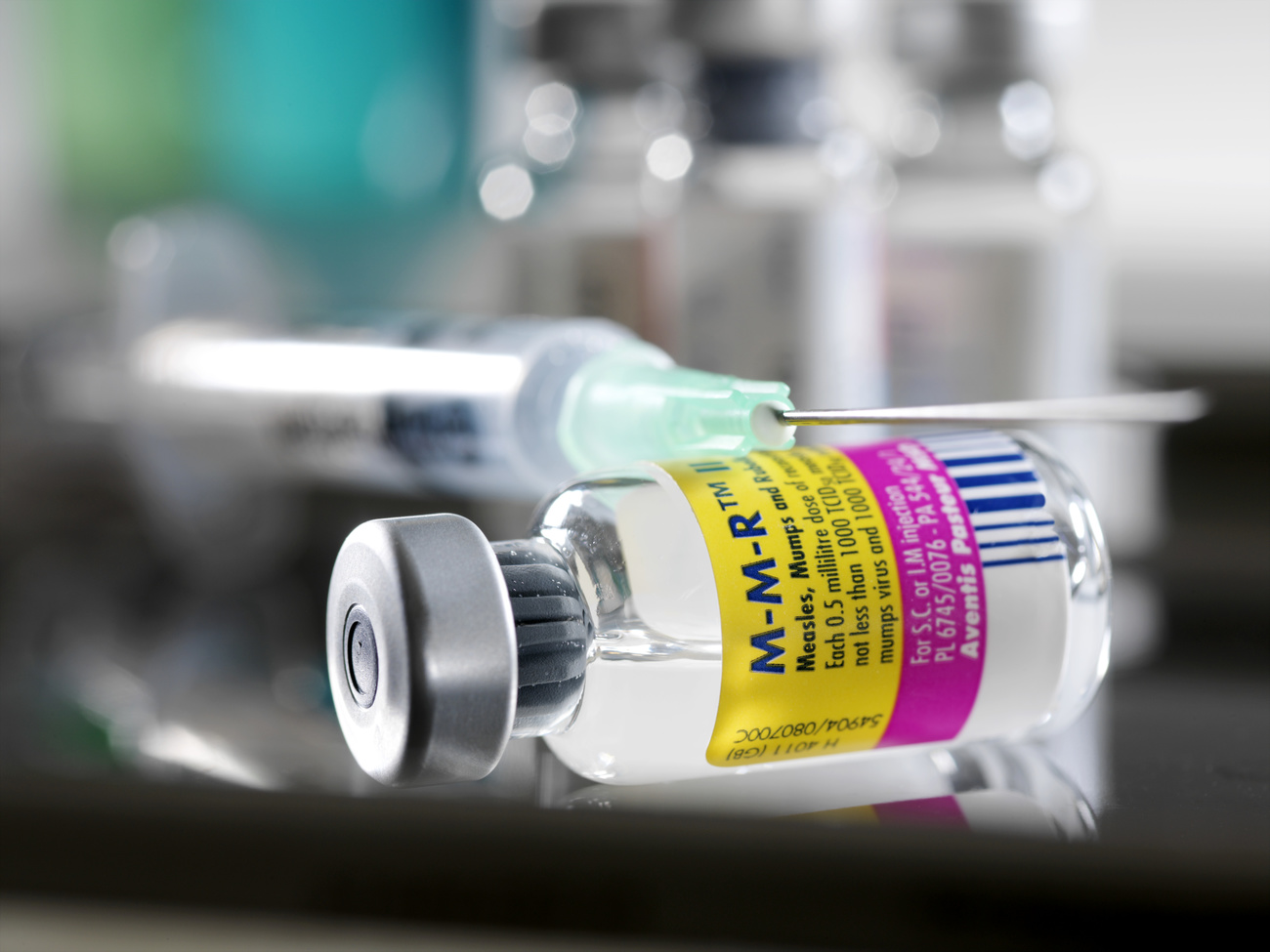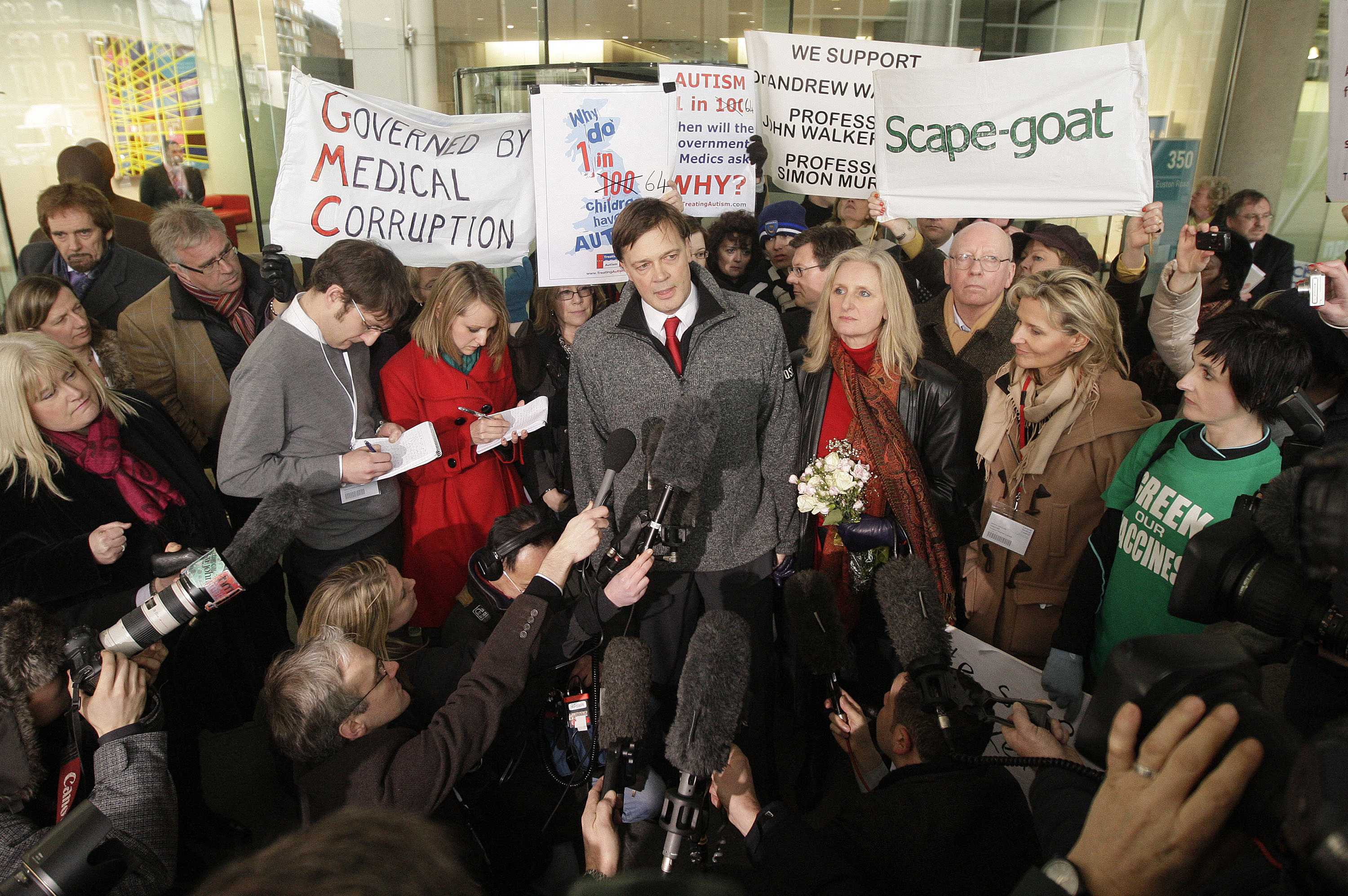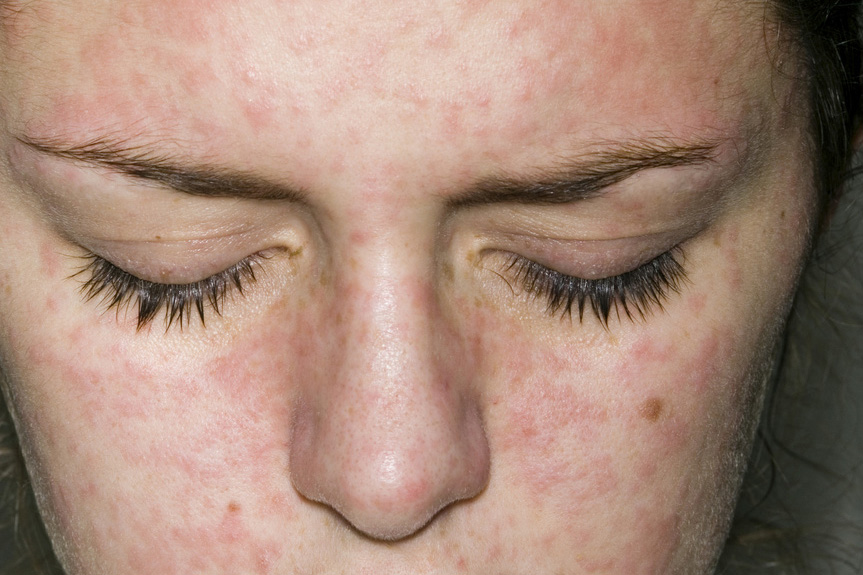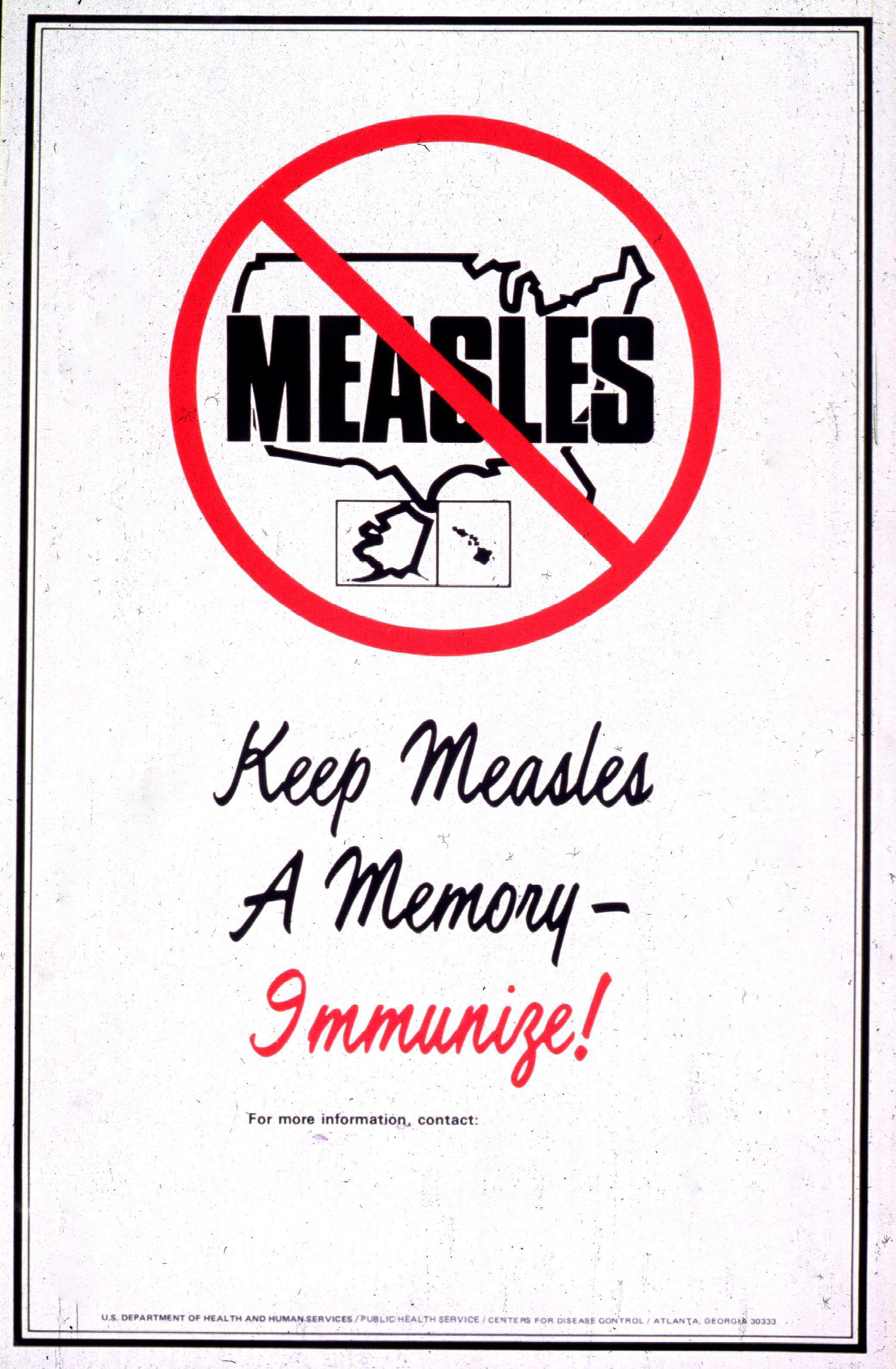
One paper, 20 years of damage

A 1998 study falsely linked the MMR vaccine to autism and triggered a steep drop in immunisation rates. Nearly three decades later, the rumour persists.
All it took to spark “the most damaging medical hoaxExternal link of the last 100 years” was a five-page academic paper that falsely claimed a link between the measles-mumps-rubella (MMR) vaccine and autism.
The article, based on a sample of just 12 children, was debunked six years later and retracted, and its lead author Andrew Wakefield was stripped of his medical licence. But by then, the damage was done.
MMR vaccine uptake in England droppedExternal link from 92% in 1995 to 80% by 2003, falling as low as 58% in some parts of London – well below the 95% needed for herd immunity and to prevent sustained transmission.

In response, UK health authorities publicly refuted the claims made by Wakefield, launched an intense public health campaign, and in 2013 initiated a catch-up programme to immunise children who had missed their MMR vaccinations years earlier. Still, it took nearly two decades for immunisation rates to recover.
Published in the prestigious Lancet medical journal in February 1998, the paper quickly made headlines in the UK, sparking widespread public debate and intense media scrutiny. Pressure on the government to provide definitive answers mounted, and parents across the country began to question whether they should be vaccinating their children.
While its impact was most pronounced in the UK, the study had ripple effects across the world, fuelling growing distrust in vaccines that continue to influence parental decisions to this day.
In 2023, global MMR coverage stood at 83% for the first dose and just 74% for the second, according to WHO dataExternal link.

More
Global concern over measles is rising. Should Switzerland worry?
Fraudulent from the start
Although the paper appeared in a prestigious medical journal, its flaws were serious – and, as later investigations revealed, deliberate. It took six years for those to be exposed, thanks to the work of British journalist Brian Deer for The Sunday Times.
Deer found out that medical records described in the paper were manipulated to fit the hypothesis. In some cases, symptoms of developmental issues appeared before the children received the MMR vaccine; in others they emerged months – not weeks – after vaccination, or not at all. These timelines were altered or omittedExternal link by Wakefield.
The study itself was methodologically weak: it included only 12 children, lacked a control group, and offered no statistical analysis. Despite this, it implied a causal link between the vaccine and autism. Moreover, the children involved in the trial were subjected to invasive procedures without proper ethical approval.
Deer also revealed that Wakefield had multiple undeclared conflicts of interest. Two years prior to the study, he had been hired as an expert witness by a lawyer preparing a lawsuit against vaccine manufacturers. The children included in the research were recruited only after this arrangement began, by selectively approaching parents whose cases appeared to support the lawsuit.
Wakefield had also filed a patent under his name for a single measles vaccine – a potential competitor to the MMR shot.
The General Medical Council, which oversees medical licensing and ethics in the UK, investigated Wakefield and revoked his medical license in 2010. Shortly after, the Lancet fully retracted the paper.
Life saving immunisation
The MMR vaccine was developed in 1971 by US microbiologist Maurice Hilleman, although a standalone measles vaccine was already available and had been introduced in Switzerland in the 1960s. Since 1985, the Swiss Federal Office of Public Health (FOPH) has recommended two doses of the combined MMR vaccine – currently scheduled at 9 and 12 months of age – which provide around 97% protectionExternal link against measles, 86% against mumps and 97% against rubella.
Globally, the impact of the vaccine has been transformative. The WHO estimatesExternal link that between 2000 and 2023, measles vaccination efforts prevented more than 60 million deaths worldwide.
MMR vaccine is safe and has no link to autism – a conclusion supported by more than two decades of scientific research, including large-scale population studies involving hundreds of thousands of children across multiple countries.
One Danish studyExternal link, for example, retrospectively analysed data from over half a million children who had received the vaccine and found no association with autism. Several other studies conducted in the UKExternal link, the USExternal link and other countriesExternal link reached the same conclusion.
The myth persists
Despite overwhelming scientific evidence, rumours about a link between the MMR vaccine and autism continue to resurface.
“This is partly because more cases of autism are being diagnosed,” explains Matteo Galizzi, Associate Professor of Behavioural Science at the London School of Economics.
Over the last decade, an increase in autism spectrum disorder (ASD) diagnoses has indeed been observed in multiple countries, including the USExternal link, the UKExternal link and SwitzerlandExternal link. Researchers largely attribute the increase to greater awareness of ASD, improved diagnostic tools and a broader definition of the condition, along with other factors.

Nevertheless, “when people hear about a rumour like the one in the Wakefield paper, and then notice more autism diagnoses, confirmation bias makes them more prone to believe that vaccines are to blame”, Galizzi says.
Heidi Larson, founder and director of the Vaccine Confidence Project and Professor at the London School of Hygiene & Tropical Medicine, agrees. “Parents are seeing this rise in diagnoses, and they naturally ask, ‘why?’ If someone offers an explanation – especially one that seems to make sense, even if it’s been debunked – they may be more inclined to accept it.”
Measles is already making a global comeback due to declining immunisation rates, and persistent rumours like this one can further undermine vaccination uptake. Health officials warn that maintaining high coverage remains essential – even in countries like Switzerland, where protection is currently strong.
The US offers a stark example. After declaring measles eliminated in 2000, the country is now facing a new epidemic. Nearly 1,000 cases and two deaths have been linked to a major outbreak that began in a Texas community with low vaccination rates and has since spread across the country.
Mixed messages
Amid the crisis, Robert F. Kennedy Jr. – Secretary of the US Department of Health and a long-time vaccine skeptic – has given mixed signals on immunisation. While he acknowledged the vaccine is “the most effective way to limit the spread” of measles and statedExternal link that “people should get the measles vaccine”, he also expressed concern about vaccine safety, saying: “Right now we don’t know the risks of many of these products because they’re not safety tested” – or, as he clarified, “not adequately tested”.
In his most recent public statements, Kennedy has not explicitly linked the MMR vaccine to autism, but he has a long history of suggesting connections between vaccines and the condition. In a 2005 article – later retracted – he blamed thimerosal, a preservative added to vials of vaccine that contain more than one dose to prevent growth of germs, for rising autism rates. More recently, he has declined to affirm that vaccines do not cause autism.
Vaccines like the MMR undergo extensive testing before approval, including multiple phases of clinical trials and rigorous post-marketing surveillance. It would now be considered unethical to run placebo-controlled trials for measles vaccines in children, given the well-established risks of the infection and the proven safety and efficacy of the vaccine.
Kennedy also recently announced a large-scale initiative to investigate what he describes as the “environmental causes” behind rising ASD diagnoses. He claimedExternal link that autism is “a preventable disease” and suggested that “you need an environmental toxin” to trigger it.
These statements have been widely refuted by scientists, who emphasise that autism is not a disease and cannot be prevented in the way Kennedy implies. Experts also warn that framing autism as something to be avoided or eliminated risks stigmatising those on the spectrum.
Edited by Virginie Mangin/ds

In compliance with the JTI standards
More: SWI swissinfo.ch certified by the Journalism Trust Initiative





























You can find an overview of ongoing debates with our journalists here . Please join us!
If you want to start a conversation about a topic raised in this article or want to report factual errors, email us at english@swissinfo.ch.